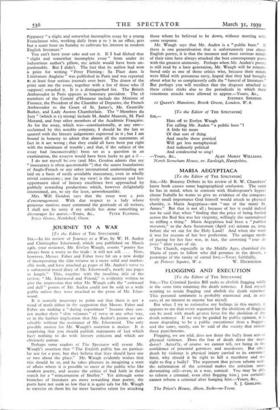JOURNEY TO A WAR [To the Editor of THE SPECTATOR]
SIR,—In his review of Tourney to a War, by W. H. Auden and Christopher Isherwood, which you published on March 24th, your reviewer, Mr. Evelyn Waugh, asserts " poetry has always been a worry to the trade : it will not sell. . . . Now, however, Messrs. Faber and Faber have hit on a new dodge of incorporating the slim volume in a more solid and market- able work, and have attached 43 pages of Mr. Auden's verse to a substantial travel diary of Mr. Isherwood's, nearly 200 pages in length." This, together with the insulting title of the review, " Mr. Isherwood and Friend," is evidently written to give the impression that what Mr. Waugh calls the " awkward and dull " poems of Mr. Auden could not be sold to a wide public unless they were attached to the prose of Mr. Isher- wood.
It is scarcely necessary to point out that there is not a word of truth either in the suggestion that Messrs. Faber and Faber are making a " daring experiment " because they can- not market their " slim volumes " of verse in any other way, or in the further implication that Mr. Auden's poems are un- saleable without the assistance of Mr. Isherwood. The only possible motive for Mr. Waugh's assertion is malice. It is surprising that you should publish statements of fact which have nothing to do with literary criticism and which are obviously untrue.
Perhaps some readers of The Spectator will resent Mr. Waugh's assertion that " The English public has no particu- lar use for a poet, but they believe that they should have one or two about the place." Mr. Waugh evidently wishes that this should be so, and he takes pleasure in imagining a state of affairs where it is possible to sneer at the public who like modern poetry, and accuse the critics of bad faith in their search for a " reincarnation of Shelley." Yet although some branches of literature are more rewarding than poetry, the poets have not sunk so low that it is quite safe for Mr. Waugh to exercise on them his far more lucrative talent for attacking
those whom he believed to be down, without meeting with some response.
Mr. Waugh says that Mr. Auden is a " public bore." If there is one generalisation that is unfortunately true about English poetry, it is that the meanest and most envious minds of their time have always attacked the best contemporary poets with the greatest animosity. Perhaps when Mr. Auden's poetry is still read by a later generation, Mr. Waugh will be remem- bered only as one of those critics who, because their minds were filled with poisonous envy, hoped that they had brought about what he so complacently calls the " funeral of literature." But perhaps you will recollect that the disgrace attached to these critics sticks also to the periodicals in which their venomous attacks were allowed to appear.—Yours, &c.,
STEPHEN SPENDER.
ri Queen's Mansions, Brook Green, London, W.6.


































































 Previous page
Previous page